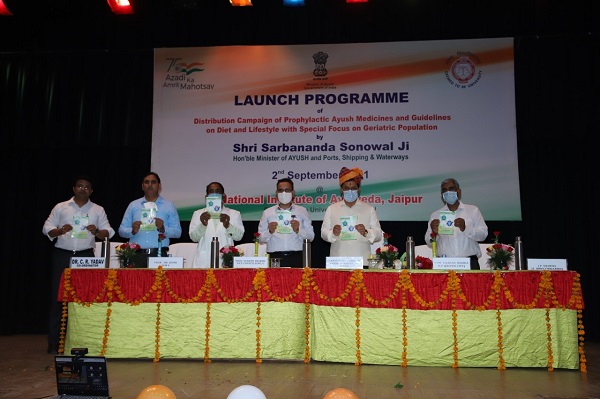New Delhi, (Samajweekly) The Ministry of Ayush on Thursday launched a campaign here to distribute Ayush prophylactic medicines and written guidelines on diet and lifestyle under the ‘Azadi Ka Amrit Mahotsav.
The drive was jointly launched by Union Minister of Ayush Sarbananda Sonowal and Minister of State for Ayush Munjpara Mahendrabhai.
In the next one year, the immunity booster medicines and the guidelines to combat Covid-19 will be distributed to 75 lakh people across the country, with special focus on geriatric (people of 60 years and above age) population and the front line workers, officials said.
The kit of Ayurveda prophylactic medicines for Covid-19 contains Sanshamani Vati, which is also known as Guduchi or Giloy Ghan Vati and Ashwagandha Ghan Vati. The kit and the guidelines have been prepared by the Central Council for Research in Ayurvedic Medicines (CCRAS).
The drive to distribute prophylactic medicines and diet and lifestyle guidelines is a part of the ongoing ‘Azadi Ka Amrit Mahotsav’ campaign launched by the Central government to commemorate 75 years of India’s freedom. The year-long campaign will continue till August 2022 when India celebrates 75th anniversary of Independence.
In his virtual address, Ayush minister said that the campaign aims at contributing to the vision and mission of Prime Minister Narendra Modi to ensure “Health for All”.
“Distribution of Ayush prophylactic medicines will help citizens to boost immunity against the corona virus. During the two waves of pandemic, people of this country showed great faith in our traditional system of medicine. Their faith has encouraged us to come up with this nationwide distribution campaign. This campaign is being carried out through the robust network of more than 86 Ayush institutions across the country,” he said while launching the drive.
Speaking on the occasion, Dr Munjpara Mahendrabhai said that the current campaign was especially focused on the 60 plus age group. “This will help boost immunity in this age group as they are considered more vulnerable in this pandemic situation,” the MoS said.










